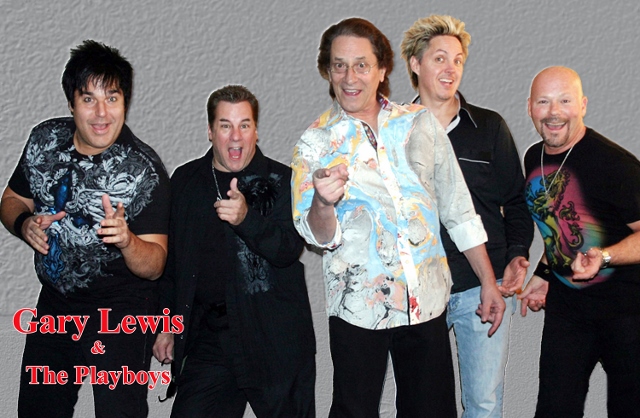Meet Our Featured Artist
The scene: The set of “Who Wants to Be a Millionaire”
The on-the-spot contestant: You
The million-dollar question: “Which is the only ’60s artist to reach the national Top 10 with its first seven single releases?”
The choices:
A. The Beatles
B. The Supremes
C. Gary Lewis and The Playboys
D. The Beach Boys
Is that your final answer?
If you picked C, you walked away with a million bucks.
 That remarkable run of hits began in February 1965 when “This Diamond Ring” knocked “You’ve Lost That Lovin’ Feelin’” out of the top spot on Billboard magazine’s Hot 100. One might think that, like many aspiring rock ’n’ roll stars, Gary had spent years playing in bands. Yet, even though he loved the music from “Hound Dog” on, his actual climb from forming a band to chart-topping act took just one year.
That remarkable run of hits began in February 1965 when “This Diamond Ring” knocked “You’ve Lost That Lovin’ Feelin’” out of the top spot on Billboard magazine’s Hot 100. One might think that, like many aspiring rock ’n’ roll stars, Gary had spent years playing in bands. Yet, even though he loved the music from “Hound Dog” on, his actual climb from forming a band to chart-topping act took just one year.
Gary’s intro to playing music came at age 5 when his dad, one Jerry Lewis (yes, that Jerry Lewis), bought a set of drums for himself. Says Gary, “I’d hear him messing around and I wanted to do like he did. One friend of my dad’s kept coming over and saying, ‘Hey, kid, come on out here. I want to show you some drum stuff.’ He taught me how to hold the sticks and keep the beat and this and that. It wasn’t until I was about 12 years old that I realized this friend of my dad’s was [the ‘world’s greatest drummer’] Buddy Rich!”
Although Gary grew up surrounded by show-biz greats, he realized early on that he didn’t want to follow in his dad’s footsteps. “Although my dad gave me shots on TV and cameo appearances in three of his movies, I learned at a very young age that I didn’t care for all that ‘yes man’ stuff. All the comedians would get together and I noticed the way everybody played each other. They would all be trying to outdo each other, and I didn’t like that one bit.”
Fast-forward to January 1964 and the College of Theatre Arts in Pasadena. “I just loved the progression of where music went up until The Beatles and then it was like, ‘Oh, my God, this is rock ’n’ roll royalty!’ Everybody had their dorm windows open and a different Beatles song was coming out of each one. It was like a mass Beatlemania over the whole city and I said, ‘I’ve gotta do this!’”
So Gary dragged his drums out of storage, enlisted some other students who played various instruments into a band, and began playing sorority and fraternity parties around L.A. Rehearsals took place in the Lewis basement when dad Jerry was out of town, using equipment bought by mother Patti. After Gary and The Playboys (as they were originally billed) scored a summertime gig at Disneyland, they hooked up with ace record producer Snuff Garrett and — in November — committed “This Diamond Ring” to tape.
Two whirlwind years of Top 10 smashes (“Ring” plus “Count Me In,” “Save Your Heart for Me,” “Everybody Loves a Clown,” “She’s Just My Style,” “Sure Gonna Miss Her” and “Green Grass”), plus two songs in the Top 15, followed. Gary and the gang were on a remarkable roll, the future so bright they had to wear shades, when — in December 1966 — Uncle Sam sent the singer an “I want you” letter.
“It was like hitting a brick wall in a car going a hundred miles an hour,” says Gary. “From hanging out with successful musicians and others, I was thrown into what the world was really like [with all its] different people.” Asked whether his dad attempted to pull some avoid-the-draft strings, Gary says, “I never asked him for any kind of help; I didn’t want to get out of it. I remember saying to myself, ‘Elvis did it; I’m going to do it.’
“The Army is the quickest way in the world to grow up, and that is exactly what I faced: growing up. You’re not special there, and you do grow up very quickly and form relationships that are real.”
Gary reported for duty on New Year’s Day 1967 and was sent to Saigon (where “I never saw combat, but I heard a lot of it”) and then to Seoul, South Korea. He was discharged in September 1968 into a stateside world changed in many ways, including musically.
“While I was in the service,” Gary recalls, “Jimi Hendrix and Janis Joplin came along, and The Doors, and I loved what was going on musically. I didn’t think that that was going to be the end of my sound, but it was. My producer, Snuffy Garrett, told me, ‘Sorry, there’s no more market for you.’ I was away almost two years and not generating any money for the company, and they left me in the dust: goodbye, see you, thanks for everything!”
Gary was rocked hard and not in a good way. “When you’re raised in a rich family, you have no idea how to live when you don’t have money. I was never taught to prepare for that ‘just in case.’ “I still worked all the time, but the venues changed from the coliseums to clubs, doing four sets a night. If I wanted to keep working, that’s what I had to do in the ’70s and early ’80s. And I did.”
He dealt with this dramatic downturn of fortunes with alcohol and drugs. “I was in despair and unhappy and [caught up in the thought that] somebody owes me something.” He laughs now at such distorted thinking, adding “the mind on alcohol is not logical. I met Donna [his wife] in 1997 and I got clean and sober in 2003. I’ll be 10 years sober on May 20. It’s the hardest thing I’ve ever done in my life.”
These days Gary’s life is again filled with joy. “I didn’t choose this business; God chose it for me and that’s how I treat it now: as one of the greatest gifts. Next year I’ll have been performing for 50 years, and that’s that I’m most proud of: lasting. It’s the greatest thing in the world. Today we’re playing to the same people we played to in the ’60s except now they’re bringing their kids, and they’re bringing their kids. It’s so amazing.”
As for the upcoming 2013 Malt Shop Memories Cruise, Gary can’t wait. “We’re going to have a ball. I love hanging out. I don’t hide. If people want to talk to me, I’ll talk to everybody. It’s very important to me, because the fans put me wherever I am. I care about them; I care about what I do. I realize what a blessing this gift of music is, and I give back to the fans as much as I can.”
Ed Osborne © 2013
Ed Osborne has spent his life immersed in music. In radio he was a DJ at America’s No. 1 FM station, where he was selected as a runner-up for Billboard’s prestigious Air Personality of the Year award. From there he moved over to management at a national radio ownership company. Later, as executive producer at BMG Special Products, he created thousands of music concepts and products for Fortune 500 corporations and direct-to-consumer companies. Today he’s a “solopreneur,” consulting with and acting as an on-camera representative for Time Life Music, producing CD reissues and writing extensively about popular music.
